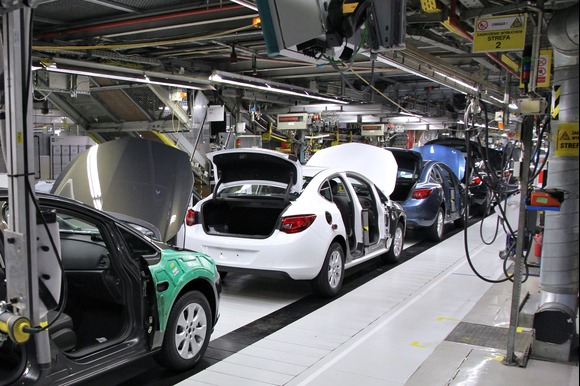UK car production has plummeted to its lowest level for May since 1949, as new US tariffs severely disrupted exports, according to the Society of Motor Manufacturers and Traders (SMMT).
Production dropped nearly 33% compared to the same month last year, reaching just 49,810 units. Excluding the slump during the Covid-19 lockdowns of 2020, this figure marks the weakest output for the month of May in 76 years, the industry body reported.
A major factor behind the steep decline was the halving of vehicle exports to the United States after the Trump administration imposed new 25% tariffs on imported cars and car parts in March. These duties immediately dampened demand, compelling several UK automakers to halt US-bound shipments altogether.
Jaguar Land Rover (JLR), the UK’s largest car manufacturer, suspended its shipments to the US starting in April, while luxury carmaker Aston Martin also scaled back exports in response to the tariffs. As a result, the share of UK car exports going to the US dropped from nearly 20% to just over 10% in May, SMMT figures show.
The SMMT attributed the sharp fall to what it described as “depressed demand instantly forcing many manufacturers to stop shipments.” However, the organization added that there is some optimism, as the US is set to reduce the import taxes by the end of June, which could help stabilize the situation.
In a bilateral agreement reached in May, the UK and US agreed to lower tariffs on up to 100,000 British-made vehicles per year from 25% to 10%. That quota mirrors the total number of UK cars exported to the US last year. Vehicles exported above that threshold will face a higher tariff of 27.5%. The agreement is expected to come into effect before the end of June, and the SMMT described the current 25% tariff as “hopefully a short-lived constraint” on the industry.
Beyond the immediate impact of the tariffs, domestic production was also hindered by ongoing transformations in UK automotive manufacturing, particularly as carmakers convert factories for electric vehicle (EV) production.
JLR, for instance, is in the process of transitioning Jaguar into an all-electric brand, while Nissan is retooling its facilities in preparation for the next-generation Leaf EV. These major restructuring efforts have temporarily affected output.
Despite the turbulent start to 2025, SMMT Chief Executive Mike Hawes struck a cautiously optimistic tone. “It has been an incredibly challenging year so far,” he said, “but there is some optimism for the future.”
Hawes pointed to recent international trade deals with major markets — including the US, EU, and India — as well as new UK government strategies on industry and trade as encouraging signs of recovery.
As part of its recently unveiled industrial strategy, the UK government has committed to initiatives that include reducing energy costs for manufacturers and launching a £2.5 billion automotive capital and research and development fund — a move the SMMT said could provide critical support to help the sector rebuild and adapt.
The next few months will be pivotal for UK carmakers as they await the implementation of the US-UK trade deal and continue to navigate the shift toward electrification amid global economic uncertainty.





